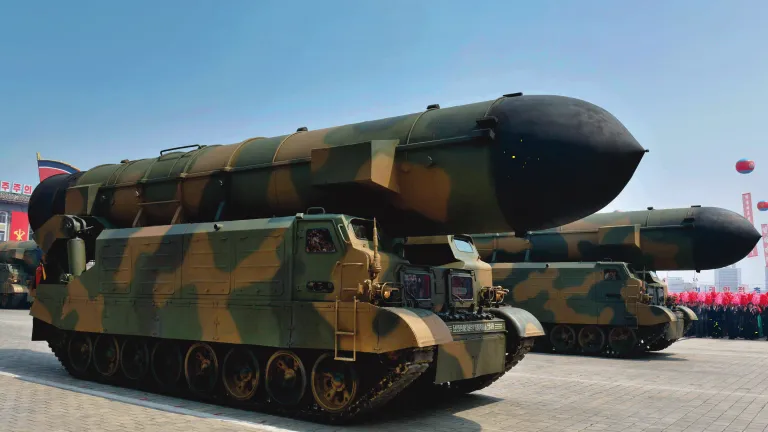Current Events & Trends: Is World War III becoming more plausible?
Could the unspeakable horror of two world wars that afflicted the first half of the 20th century actually happen again? Will many of the nations that fought in those colossal struggles enter yet another global war? Will war spread around the world or alternatively occur only in key geostrategic locations?
Today well-armed, unstable rogue nations like Iran and North Korea threaten to propel mankind into another global conflagration. Many liberal observers are ignoring the signposts of future war found in resurgence of regressive and exclusivist forces like unbridled nationalism and religious sectarianism.
For those with eyes to see, however, the symptoms and signs are everywhere. We begin with North Korea and progress to other even more dangerous hotspots and potential flashpoints that dot the globe.
North Korea threatens American shores
Consider an amazing headline: "Pyongyang Threatens Rockets and Nuclear Tests to 'Target US'" (The Times, Jan. 25, 2013). This rogue country's nuclear tests are part of an ambitious plan—"a new phase of the anti-US struggle," according to an official statement from its National Defence Commission ("North Korea Nuclear Test Threat 'Needlessly Provocative,' Says US," The Telegraph, Jan. 24, 2013).
The statement continued: "We do not hide [the fact] that a variety of satellites and long-range rockets which will be launched by the D.P.R.K [Democratic People's Republic of Korea] one after another and a nuclear test of higher level will target against the U.S., the sworn enemy of the Korean people" ("North Korea Issues Blunt New Threat to United States," The New York Times, Jan. 24, 2013).
If this notoriously rogue nation did not enjoy tacit Chinese backing, perhaps we wouldn't need to be so concerned. America's official response to this threat from the top U.S. envoy for North Korean diplomacy proved shockingly mild in nature: "We hope they don't do it. We call on them not to do it" (quoted in "North Korea Threatens Nuclear Test and Further Rocket Launches," The Guardian, Jan. 24, 2013, emphasis added throughout). Can you imagine most past American presidential administrations having envoys issue such statements? Not surprisingly, North Korea went ahead with another nuclear warhead test Feb. 12.
Meanwhile, the United States continues to downsize its awesome military might. While it may decide to withdraw from the world, rogue countries, sensing America's weakness, will not withdraw from increasingly threatening and harassing its national interests. The Wall Street Journal predicted that "the nuclear threat to Japan and the U.S. will soon be real" (Dec. 13, 2012). Sources: The Guardian, The New York Times, The Telegraph, The Times [London], The Wall Street Journal.)
Asian nations fear Chinese military buildup
Japan and other Asian countries are awakening to the Chinese threat. Recently India's outgoing army chief, Gen. V.K. Singh, warned his nation to wake up to China's imperialism and growing army strength. Japan is already flexing its military muscle. Tokyo actively disputes with Beijing over the ownership of tiny Pacific islands, using very tough language from time to time.
Robert Kaplan, chief geopolitical analyst for the global intelligence firm Stratfor, stated in The Wall Street Journal: "Asia is in the midst of a feverish arms race, featuring advanced diesel-electric submarines, the latest fighter jets and ballistic missiles. China . . . is projecting air and sea power into what it regards as the blue national soil of the South China and East China seas" ("The Return of Toxic Nationalism," Dec. 23, 2012).
Kaplan further observed that "the disputes in Asia are not about ideology or any uplifting moral philosophy; they are about who gets to control space on the map." Territorial ambitions stubbornly remain a basic cause of conflict between and among nations.
Japan wants closer relations with South Korea and fervently desires a strong and even expanding American military counter-presence in the Pacific. (Sources: Press Trust of India, The Wall Street Journal.)
Russia's aggressive hostility
"In Russia," says Robert Kaplan in The Wall Street Journal, "Vladimir Putin's nationalism is a large factor in his high popularity. President Putin's nationalism is geographical determinism: He wants to recreate buffer states in Eastern Europe, the Caucasus and Central Asia, like in the old Soviet Union" (Dec. 23, 2012).
And Moscow continues to project its perceived interests into the Middle East—the most volatile region on this war-weary planet and one that will feature in the fulfillment of end-time biblical prophecy (read the Bible study guide The Middle East in Bible Prophecy to learn more).
Already both Russia and China have blocked attempts in the United Nations to bring Syria's Bashar al-Assad to heel. But Putin is not content with just exercising his diplomatic influence.
"Five Russian landing ships carrying hundreds of marines and military vehicles are gathering in the eastern Mediterranean in a show of force" ("Russian Naval Force Gathers off Syria in Warning to West," The Sunday Times, Jan. 6, 2013). Presumably, Moscow's main objective is to forestall any Western intervention in Syria. (Sources: The Sunday Times [London], The Wall Street Journal.)
Iranian threats parallel those of Russia
Even Russia acknowledges that at the end of the day Syria's Assad most probably will not survive all that much longer. But not Iran. According to a London Sunday Times piece, "Iran will defend the Syrian government to the end to preserve an 'axis of resistance' to Israel and the West, its ambassador in Damascus has warned. It is already providing military and security advice to Syrian forces caught in an 'impasse' with rebels fighting to oust President Bashar al-Assad, said Mohammad Reza Raouf Sheibani, the ambassador" ("Iran Will Defend Assad to the End," Jan. 27, 2013).
Especially in its dire circumstances, Syria should not feel free to arm terrorist groups bitterly hostile to the survival of the state and people of Israel. Recently Tel Aviv's warplanes destroyed a convoy of Syrian trucks loaded with advanced, high-tech weapons destined for Hezbollah, a notorious terrorist group.
Israel's encirclement by hostile nations is the subject of an article in this issue of The Good News titled "Israel: A Nation in Constant Peril". The article also provides a brief outline of where the Middle East is ultimately headed in terms of end-time Bible prophecy. (Source: The Sunday Times [London], Jan. 27, 2013.)
Summing up
Many nations of this present evil world are heavily armed with deadly modern weaponry of all kinds. Moreover, hostility, hatred and runaway nationalism and sectarianism dividing countries, ethnic groups, religions, cultures and ideologies will eventually culminate in Armageddon and the second coming of Jesus Christ. The psalmist asked: "Why do the nations rage and the people plot a vain thing? The kings of the earth set themselves, and the rulers take counsel together, against the Lord and against His Anointed [God the Father and Jesus Christ] . . ." (Psalm 2:2).
Ultimately all of this malice and strife is in defiance of God. Yet only God can put a permanent end to the current madness afflicting mankind. And this God will do!








